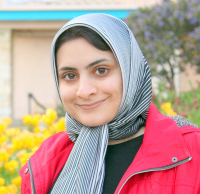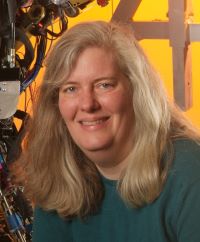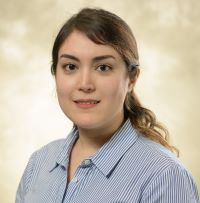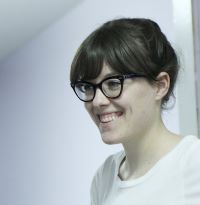New Faculty Introduction Series
SCS is proud to announce the New Faculty Introduction Series, a weekly showcase of the current research and creative work from our most recent faculty additions. Each event will feature two new faculty members focused on similar topics who will each present an overview of their work. Their department head or a senior faculty member will then moderate a live Q&A session, for which audience members/viewers can presubmit questions or ask in real time.
We invite all members of the SCS community, including our corporate, government and foundation partners, to join us in sharing insights, building connections and welcoming our newest faculty members.
Featured Faculty: Yonatan Bisk and Shinji Watanabe
February 18, 2021
Yonatan Bisk
Assistant Professor, Language Technologies Institute, School of Computer Science
Carnegie Mellon University
Yonatan is an assistant professor of computer science with a primary research focus on natural language processing for grounding either in visual perception or robotic control. His research focuses on the gap between the knowledge captured by models from text alone and the richness of meaning accessible to humans via perception and interaction. He did his Ph.D. work at the University of Illinois Urbana-Champaign on Bayesian models for unsupervised syntax, after which he spent time at USC's Information Sciences Institute with Daniel Marcu, the University of Washington with Yejin Choi and Microsoft Research with Jianfeng Gao.
Shinji Watanabe
Associate Professor, Language Technologies Institute, School of Computer Science
Carnegie Mellon University
Shinji is an associate professor and was a research scientist at NTT Communication Science Laboratories, Kyoto, Japan, from 2001 to 2011. He was also a visiting scholar at Georgia Institute of Technology in 2009, a senior principal research scientist at Mitsubishi Electric Research Laboratories (MERL) from 2012 to 2017, and an associate research professor at Johns Hopkins University from 2017 to 2020. His research interests include automatic speech recognition, speech enhancement, spoken language understanding, and machine learning for speech and language processing.
Shinji received his B.S., M.S., and Ph.D. (Dr. Eng.) from Waseda University in Tokyo.
Moderated By
Jamie Callan
Interim Director and Professor, Language Technologies Institute, School of Computer Science
Carnegie Mellon University
Jamie Callan is a professor and the interim director at the Language Technologies Institute. His research and teaching focus on text-based information retrieval and analysis. His recent work develops advanced search engine architectures, neural search algorithms, use of semi-structured knowledge for open domain search, conversational information seeking, and large-scale distributed search. Jamie has published more than 200 research papers on these and related subjects.
Jamie received his BA. in applications of computer science at the University of Connecticut, his M.S. in computer and information science from the University of Massachusetts, and his Ph.D. in computer science from the University of Massachusetts.
View the recording from this talk below.
Featured Faculty: Jun-Yan Zhu and Zac Manchester
March 4, 2021
Assistant Professor, Robotics Institute, School of Computer Science
Carnegie Mellon University
Jun-Yan is an assistant professor in the Robotics Institute with affiliated appointments in the Computer Science Department and Machine Learning Department. He studies computer vision, computer graphics, machine learning and computational photography, with the goal of building intelligent machines capable of recreating our visual world.
Prior to joining CMU, he was a research scientist at Adobe Research. He did a postdoc at MIT CSAIL, working with William Freeman, Josh Tenenbaum and Antonio Torralba. He obtained his Ph.D. from UC Berkeley, under the supervision of Alexei Efros, and received his B.E. from Tsinghua University, working with Zhuowen Tu, Shi-Min Hu and Eric Chang.
Assistant Professor, Robotics Institute, School of Computer Science
Carnegie Mellon University
Zac is an assistant professor in the Robotics Institute with a courtesy appointment in the College of Engineering's Electrical and Computer Engineering Department. He is interested in things that move. His goal is to enable robotic systems that can match or exceed the level of agility, efficiency and robustness demonstrated by humans and animals — especially in challenging environments. One focus of his research is building on ideas from control, estimation, game theory, optimization and physics to develop new algorithms. Another is designing and building hardware systems to bring these algorithms to life, including legged robots, teams of networked drones and swarms of tiny satellites.
Zac received both his B.S. and Ph.D. at Cornell University.
Moderated By
Allen Newell University Professor of Computer Science and Robotics, Robotics Institute, School of Computer Science
Carnegie Mellon University
Jessica Hodgins is a professor in the Robotics Institute and Computer Science Department. Her research focuses on computer graphics, animation and robotics, with an emphasis on generating and analyzing human motion. From 2008 to 2016, she founded and ran research labs for Disney, rising to VP of research and leading the labs in Pittsburgh and Los Angeles. From 2005 to 2015, she was associate director for faculty in the Robotics Institute, running the promotion and tenure process and creating a mentoring program for pretenure faculty. Prior to moving to Carnegie Mellon in 2000, she was an associate professor and assistant dean in the College of Computing at Georgia Institute of Technology.
Jessica received her Ph.D. in Computer Science from CMU in 1989.
Featured Faculty: Melisa Orta Martinez & Nikolas Martelaro
March 11, 2021
Melisa Orta Martinez
Assistant Professor, Robotics Institute, School of Computer Science
Carnegie Mellon University
Melisa Orta Martinez is an assistant professor in the Robotics Institute, where she leads the Social Haptics Robotics and EDucation Laboratory (SHRED Lab).
She is originally from Mexico City, where she studied electronic systems engineering at the Tecnologico de Estudios Superiores de Monterrey. After completing her undergraduate studies, she came to the U.S. to pursue a master's degree in electrical engineering at Stanford University, after which she worked at Apple as a firmware engineer in the Human Input Devices group. She then returned to Stanford to pursue a Ph.D. in mechanical engineering at the Collaborative Haptics and Robotics in Medicine Laboratory (CHARM Lab).
Nikolas Martelaro
Assistant Professor, Human-Computer Interaction Institute, School of Computer Science
Carnegie Mellon University
Nik is an assistant professor in the Human-Computer Interaction Institute. His lab focuses on augmenting designer's capabilities through the use of new technology and design methods. His interest in developing new ways to support designers stems from his interest in creating interactive and intelligent products. He blends a background in product design methods, interaction design, human-robot interaction and mechatronic engineering to build tools and methods that allow designers to understand people better and to create more human-centered products. Currently, his lab is exploring how to support designers with AI-based design tools, how to create great human-robot interaction and how to conduct remote user research.
Before moving to the HCII, he was a researcher in the Digital Experiences group at the Accenture Technology Labs. He graduated with his Ph.D. in mechanical engineering from Stanford's Center for Design Research where he was co-advised by Larry Leifer and Wendy Ju.
Moderated By
Associate Professor, Human-Computer Interaction Institute, School of Computer Science
Carnegie Mellon University
Chris is an associate professor in the Human-Computer Interaction Institute. He directs the Future Interfaces Group, which broadly investigates novel sensing technologies and interaction techniques that foster powerful and natural interactions between humans and computers. These efforts often lie in emerging use modalities, such as mobile computing, touch interfaces and gestural interaction. Harrison was recently named one of the top 30 scientists under 30 by Forbes, a top 35 innovator under 35 by MIT Technology Review, and one of six innovators to watch in 2013 by Smithsonian. He has been awarded fellowships by Google, Microsoft Research and Qualcomm.
Chris received his Ph.D. in human-computer interaction in 2013 from CMU, where he was advised by Scott Hudson.
View the recording from this talk below.
Featured Faculty: Vincent Hellendoorn & Dominik Moritz
March, 18, 2021
Vincent Hellendoorn
Assistant Professor, Institute for Software Research, School of Computer Science
Carnegie Mellon University
Vincent is an assistant professor in the Institute for Software Research, where he builds intelligent tools for software engineering. His work is mainly in software engineering and machine learning. He studies how developers communicate their expectations when writing software and how we can learn from these effectively (through deep machine learning). He also he identifies downstream applications and builds the corresponding tools that such models unlock.
Vincent received his B.S. and M.S. from Delft University, and his Ph.D. from UC Davis.
Dominik Moritz
Senior Project Scientist, Human-Computer Interaction Institute, School of Computer Science
Carnegie Mellon University
Dominik Moritz is on the faculty of the Human-Computer Interaction Institute (HCII) and works on data visualization and interactive systems for artificial intelligence. He co-leads the Data Interaction Group, researching scalable interactive systems for visualization and analysis. His systems, including Vega-Lite, Falcon, Draco, Voyager and others, have won awards at premier academic venues and are used by the Python and JavaScript data science communities.
Dominik received his Ph.D. from the Paul G. Allen School at the University of Washington, where he worked with Jeff Heer and Bill Howe in the Interactive Data Lab and the Database Group.
Moderated By
Director and Professor, Institute for Software Research, School of Computer Science
Carnegie Mellon University
James Herbsleb is a professor in and director of the Institute for Software Research in the School of Computer Science. His research interests lie primarily in the intersection of software engineering, computer-supported cooperative work and socio-technical systems, focusing on such areas as geographically distributed development teams and large-scale open source development.
He holds a Ph.D. in psychology and a master's in computer science.
View the recording from this talk below.
Featured Faculty: Motahhare Eslami & Hoda Heidari
April 1, 2021
Hoda Heidari
Assistant Professor, Machine Learning Department and Institute for Software Research, School of Computer Science
Carnegie Mellon University
Hoda is an assistant professor with joint appointments in the Machine Learning Department and the Institute for Software Research. She is broadly interested insocietal aspects of artificial intelligence and machine learning and algorithmic economics.
Hoda completed her doctoral studies in computer and information science at the University of Pennsylvania under the supervision of Michael Kearns and Ali Jadbabaie. During her time at Penn, she also obtained an M.Sc. degree in statistics from the Wharton School of Business.
 Motahhare Eslami
Motahhare Eslami
Assistant Professor, Human-Computer Interaction Institute, School of Computer Science
Carnegie Mellon University
Motahhare is an assistant professor in the Human-Computer Interaction Institute and an academic researcher at Facebook UX research. Her research is broadly in human-computer interaction, social computing and data mining. She has developed techniques to investigate users’ behavior around opaque algorithmic systems, redesign these systems to communicate opaque algorithmic processes to users and provide them with a more informed, satisfying and engaging interaction.
She received her Ph.D. in computer science from the University of Illinois at Urbana-Champaign, where she was advised by Karrie Karahalios.
 John Zimmerman
John Zimmerman
Tang Family Professor of Artificial Intelligence and Human-Computer Interaction, Human-Computer Interaction Institute, School of Computer Science
Carnegie Mellon University
John is an associate professor with a joint appointment between the School of Design and the HCII. He teaches studios and seminars on interaction design, as well as a course on mobile service innovation. His research falls into four areas: interaction with intelligent systems, designing for the self, public service innovation via social computing and research through design.
Before joining CMU, John was a senior researcher at Philips Electronics, where he designed interactive television products and intelligent devices for the home. John holds an M.Des in interaction design from Carnegie Mellon’s School of Design, and he enjoys teaching students in this program.
View recording from this talk below.
Featured Faculty: Ken Holstein & Sarah Fox
April 8, 2021
Ken Holstein
Assistant Professor, Human-Computer Interaction Institute, School of Computer Science
Carnegie Mellon University
Ken is an assistant professor in the Human-Computer Interaction Institute, where he directs the Co- Augmentation, Learning & AI (CoALA) Lab. He is the PI or co-PI on several projects focused on the design, development and evaluation of AI systems that complement and bring out the best of human ability in work that people find personally meaningful. In his research, he partners with relevant stakeholders to co-design systems that draw upon complementary strengths (and mitigate biases) of human and AI decision-makers.
Ken received his Ph.D. in human-computer interaction from CMU.
Sarah Fox
Assistant Professor, Human-Computer Interaction Institute, School of Computer Science
Carnegie Mellon University
Sarah is an assistant professor in the Human Computer Interaction Institute, where she directs the Tech Solidarity Lab and is a founding member of the Community-Tech Collective. Her research focuses on how technological artifacts challenge or propagate social exclusions by examining existing systems and building alternatives. Her work has earned awards in leading computing venues including ACM CSCW, CHI and DIS, and has been featured in Design Issues, the Journal of Peer Production, and New Media and Society. Prior to CMU, she was a postdoctoral scholar in the Department of Communication and the Design Lab at the University of California, San Diego.
She holds a Ph.D. in human centered design and engineering from the University of Washington and has worked in design research at Microsoft Research, Google and Intel Labs.
Vincent Aleven
Professor and Director of Undergraduate Programs in Human-Computer Interaction, Human-Computer Interaction Institute, School of Computer Science
Carnegie Mellon University
Vincent is a professor in the Human-Computer Interaction Institute and director of its undergraduate programs (including the HCI additional major and minor). His research aims to advance the science of how people interact and learn with advanced learning technologies. He hopes to realize the enormous promise of these technologies to help learners reach their full potential. Vincent is always excited to help educate a new generation of scientists and professionals.
He received his master of science in computer science from Delft University of Technology (TU Delft) in 1988 and his Ph.D. in intelligent systems from the University of Pittsburgh in 1997.
View recording from this talk below.
Featured Faculty: Alexandra Ion & David Lindlbauer
April 15, 2021
Alexandra Ion
Assistant Professor, Human-Computer Interaction Institute, School of Computer Science
Carnegie Mellon University
Alexandra is an assistant professor in the Human-Computer Interaction Institute. She directs the Interactive Structures Lab, which investigates and develops interactive design tools that enable digital fabrication of complex shapes and structures for novice users. Her research and expertise lie at the intersection of human-computer interaction, digital fabrication metamaterials and computational design. Alex’s research has been published in and earned awards from premier HCI venues. Alex has also been invited to multiple exhibitions, including a permanent exhibition at the Ars Electronica Center and traveling exhibitions through South America and Germany.
Before joining CMU, Alex was a postdoc at ETH Zurich, and a Ph.D. student at the Hasso Plattner Institute in Germany.
David Lindlbauer
Assistant Professor, Human-Computer Interaction Institute, School of Computer Science
Carnegie Mellon University
David Lindlbauer is an assistant professor in the Human-Computer Interaction Institute, where his research focuses on understanding how humans perceive and interact with digital information, and how to build technology that goes beyond the flat displays to advance our capabilities when interacting with the virtual world. To achieve this, he creates and studies enabling technologies and computational approaches that control when, where and how virtual content is displayed to increase the usability of mixed reality interfaces.
Before CMU, he was a postdoc at ETH Zurich in the AIT Lab of Otmar Hilliges. He completed his Ph.D. at TU Berlin in the Computer Graphics group, advised by Marc Alexa.
Moderated By
Professor, Human-Computer Interaction Institute, School of Computer Science
Carnegie Mellon University
Scott Hudson is a professor in the Human-Computer Interaction Institute in the School of Computer Science, and served for many years as the founding director of the HCII Ph.D. program. He was previously an associate professor in the College of Computing at the Georgia Institute of Technology, and prior to that an assistant professor of computer science at the University of Arizona. Scott's research interests over time have covered a wide range of human-computer interaction topics, but have a center of gravity in technical aspects of HCI. They have generally included the invention and building of things that lead to a better user experience, or enabling new capabilities for new sets of people (although often indirectly through tools).
He earned his Ph.D. in computer science at the University of Colorado in 1986.
View the recording from this talk below.




















